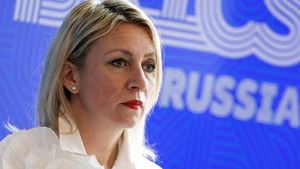Georgia has announced it will suspend its European Union accession talks until the end of 2028, marking a significant shift amid rising tensions with the EU. Prime Minister Irakli Kobakhidze made the announcement on Thursday, countering criticism from Brussels following significant irregularities recorded during last month’s parliamentary elections.
Following the European Parliament's non-binding resolution rejecting the results of the October 26 election, Kobakhidze accused European politicians of 'blackmail,' stating, "We have decided not to put the issue of opening negotiations with the European Union on the agenda until the end of 2028." This resolution called not only for new elections under international oversight but also for sanctions against several high-ranking Georgian officials.
The elections, which resulted in the ruling Georgian Dream party securing nearly 54 percent of the vote, were marred by allegations of fraud and manipulation, leading to widespread boycotts from opposition parties who deemed the results as invalid. Pro-Western President Salome Zourabichvili has called the election “unconstitutional” and is seeking to have its results annulled through the Constitutional Court.
This suspension of accession talks signals a complicated relationship between Georgia and the EU, especially as Georgia’s aspiration for EU membership is enshrined within its constitution. While the country gained EU candidate status just last December, pressures from geopolitical tensions and accusations of backsliding on democratic values have put those aspirations at risk.
The Georgian Dream party has acknowledged the necessity for reforms and expressed its intention to strengthen the country's readiness for EU membership by 2028, stating, “by then, Georgia will be more prepared than any other candidate country to open accession talks.” Surveys reflect considerable public support for EU membership, indicating the general populace's favor toward pro-European integration, particularly following the 2008 war with Russia, which has led to pervasive distrust of its neighboring larger power.
Public protests erupted after the government’s announcement, with thousands taking to the streets of Tbilisi to voice their dissatisfaction with what they perceive as the ruling party’s disregard for democratic processes and its shift toward closer ties with Russia. Activists waved EU flags during demonstrations, symbolizing their desire to maintain European standards and values.
An atmosphere of conflict has also emerged within Georgia's political circles, as the opposition has leveled accusations of electoral fraud against the Georgian Dream party. This has deepened the schism between pro-European and pro-Russian sentiments among Georgia's leadership.
Kobakhidze's comments reflected the growing frustrations with the EU's approach to Georgia, which the Government believes undermines the country’s sovereignty. This relationship has been strained by recent legislation perceived as authoritarian, including laws regulating civil society and LGBTQ rights, which have drawn sharp rebukes from European bodies.
Compounding the unrest, there have been calls from various EU legislators demanding independent investigations of the election, exacerbated by claims of vote tampering and intimidation. The European Parliament’s resolution firmly stated its rejection of the October election results, asserting they were neither free nor fair.
The Georgia elections have highlighted the precarious balance the nation must navigate as it aspires to integrate with Western institutions, juxtaposed against the potent influence of Russia. The ruling party's actions suggest a grappling with the legacy of Russian influence, raising concerns about how Georgia will proceed on its European path.
With the EU's previous decision to place Georgia's accession process on hold, these developments present both immediate and long-term challenges for Georgia. Political analysts suggest the suspension might be perceived as Georgia’s retreat from the European orbit
While the aspirations for EU membership remain core to Georgia’s identity as it continues to implement necessary reforms, the next few years will undoubtedly shape its political future and its relationship with both the EU and Russia.
The tension underscored by Kobakhidze’s remarks, Zourabichvili’s responses, and the public's fervent protests indicate the coming months will be pivotal for Georgia's prospects. The aftermath of the October elections, coupled with the government's response to EU relations, will form the narrative of Georgia's political scene as it seeks its place on the European stage.



